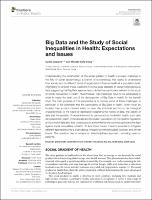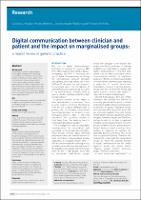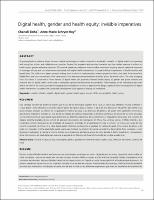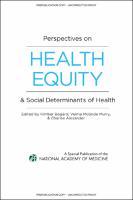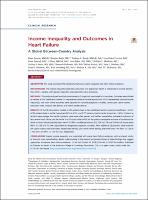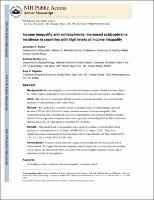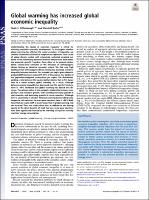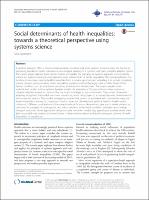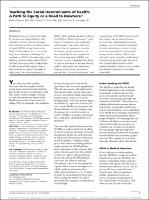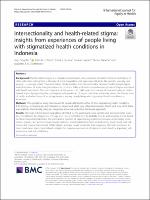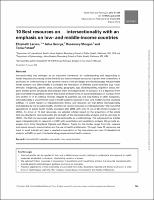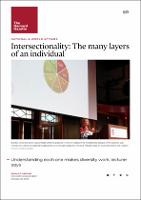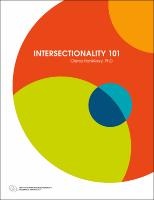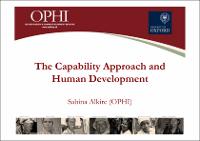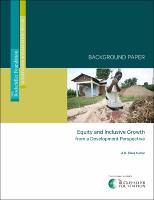1. Health Equity: Recent submissions
Big Data and the Study of Social Inequalities in Health: Expectations and Issues
(Frontiers in Public Health, 2018-10-26)
Understanding the construction of the social gradient in health is a major challenge in
the field of social epidemiology, a branch of epidemiology that seeks to understand
how society and its different forms of organization influence health at a population level.
Attempting to answer these questions involves large datasets of varied heterogeneous
data suggesting that Big Data approaches could be then particularly relevant to the study
of social inequalities in health. Nevertheless, real challenges have to be addressed in
order to make the...
Digital communication between clinician and patient and the impact on marginalised groups: a realist review in general practice
(British Journal of General Practice, 2015-12)
Background Increasingly, the NHS is embracing the use of digital communication technology for communication between clinicians and patients. Policymakers deem digital clinical communication as presenting a solution to the capacity issues currently faced by general practice. There is some concern that these technologies may exacerbate existing inequalities in accessing health care. It is not known what impact they may have on groups who are already marginalised in their ability to access general practice. Aim To assess the potential impact of th...
Digital health, gender and health equity: invisible imperatives
(Journal of Public Health, 2018-12-01)
A growing body of evidence shows the use of digital technologies in health—referred to as eHealth, mHealth or ‘digital health’—is improving and saving lives in low- and middle-income countries. Despite this prevalent and persistent narrative, very few studies examine its effects on health equity, gender and power dynamics. This journal supplement addresses these invisible imperatives by going beyond traditional measures of coverage, efficacy and cost-effectiveness associated with digital health interventions, to unpack different experiences of h...
Perspectives on health equity and social determinants of health
(National Academy Of Medicine, 2017)
Social factors, signals, and biases shape the health of our nation. Racism and poverty manifest in unequal social, environmental, and economic conditions, resulting in deep-rooted health disparities that carry over from generation to generation. In Perspectives on Health Equity and Social Determinants of Health, authors call for collective action across sectors to reverse the debilitating and often lethal consequences of health inequity. This edited volume of discussion papers provides recommendations to advance the agenda to promote health eq...
Income Inequality and Outcomes in Heart Failure
(2019)
OBJECTIVES This study examined the relationship between income inequality and heart failure outcomes. BACKGROUND The income inequality hypothesis postulates that population health is influenced by income distribution within a society, with greater inequality associated with worse outcomes. METHODS This study analyzed heart failure outcomes in 2 large trials conducted in 54 countries. Countries were divided by tertiles of Gini coefficients (where 0% represented absolute income equality and 100% represented absolute income inequality), and heart fa...
Income inequality and schizophrenia: Increased schizophrenia incidence in countries with high levels of income inequality
(2014-03)
Background—Income inequality is associated with numerous negative health outcomes. There is evidence that ecological level socio-environmental factors may increase risk for schizophrenia. Aims—The aim was to investigate whether measures of income inequality are associated with incidence of schizophrenia at the country level. Method—We conducted a systematic review of incidence rates for schizophrenia, reported between 1975 and 2011. For each country, national measures of income inequality (Gini coefficient) along with covariate risk factors for...
Global warming has increased global economic inequality
(2019-05-14)
Significance We find that global warming has very likely exacerbated global economic inequality, including ∼25% increase in population-weighted between-country inequality over the past half century. This increase results from the impact of warming on annual economic growth, which over the course of decades has accumulated robust and substantial declines in economic output in hotter, poorer countries—and increases in many cooler, wealthier countries—relative to a world without anthropogenic warming. Thus, the global warming caused by...
Economists: Your Parents Are More Important Than Ever
(the Atlantic)
Global warming has increased global economic inequality
(The Journalist's Resource, Shorenstein center on media, politics and public policy, Harvard Kennedy School, 2019-05-14)
Significance We find that global warming has very likely exacerbated global economic inequality, including ∼25% increase in population-weighted between-country inequality over the past half century. This increase results from the impact of warming on annual economic growth, which over the course of decades has accumulated robust and substantial declines in economic output in hotter, poorer countries—and increases in many cooler, wealthier countries—relative to a world without anthropogenic warming. Thus, the global warming caused by...
Social determinants of health inequalities: towards a theoretical perspective using systems science
(2015)
A systems approach offers a novel conceptualization to natural and social systems. In recent years, this has led to perceiving population health outcomes as an emergent property of a dynamic and open, complex adaptive system. The current paper explores these themes further and applies the principles of systems approach and complexity science (i.e. systems science) to conceptualize social determinants of health inequalities. The conceptualization can be done in two steps: viewing health inequalities from a systems approach and extending it to in...
Teaching the Social Determinants of Health: A Path to Equity or a Road to Nowhere?
Medical schools are increasingly called
to include social responsibility in their
mandates. As such, they are focusing
their attention on the social determinants
of health (SDOH) as key drivers in the
health of the patients and communities
they serve. However, underlying this
emphasis on SDOH is the assumption that
teaching medical students
about
SDOH
will lead future physicians to take
action
to help achieve health equity. There is
little evidence to support this belief. In
many ways, the current approach to
SDOH within medical...
Intersectionality and health-related stigma: insights from experiences of people living with stigmatized health conditions in Indonesia
(International Journal for Equity in Health, 2020-12)
Abstract Background Health-related stigma is a complex phenomenon, the experience of which intersects with those of other adversities arising from a diversity of social inequalities and oppressive identities like gender, sexuality, and poverty – a concept called “intersectionality”. Understanding this intersectionality between health-related stigma and other forms of social marginalization can provide a fuller and more comprehensive picture of stigma associated with health conditions. The main objective ...
Group inequality and intersectionality
(E-Bulletin of the Human Development & Capability Association, 2014-07)
10 Best resources on… intersectionality with an emphasis on low- and middle-income countries
(Health Policy and Planning, 2016-10-01)
Intersectionality has emerged as an important framework for understanding and responding to health inequities by making visible the fluid and interconnected structures of power that create them. It promotes an understanding of the dynamic nature of the privileges and disadvantages that permeate health systems and affect health. It considers the interaction of different social stratifiers (e.g. ‘race’/ ethnicity, indigeneity, gender, class, sexuality, geography, age, disability/ability, migration status, religion) and the power structures that und...
Understanding each one makes diversity work, lecturer says
(the Harvard Gazette, 2022-10)
INTERSECTIONALITY 101
(Institute for Intersectionality Research and Policy)
Interest in and applications of intersectionality have grown exponentially in popularity
over the last 15 years. Scholars across the globe from a variety of disciplines, including
sociology, political science, health sciences, geography, philosophy and anthropology, as
well as in feminist studies, ethnic studies, queer studies and legal studies, have drawn on
intersectionality to challenge inequities and promote social justice. This practice has also
extended to policy makers, human rights activists and community organizers search
-
ing ...
The Capability Approach and Human Development
(OPHI : Oxford Poverty & Human Development Initiative)
Equity and Inclusive Growth from a Development Perspective
(The Rockefeller Foundation)
Dr. A.K. Shiva Kumar wrote Equity and Inclusive Growth from a Development Perspective to supplement a series of workshops with Rockefeller Foundation staff in 2012 and 2013. The paper has since become the “go-to” source for knowledge about development concepts that are important to designing, implementing, monitoring, and evaluating the work of the Foundation.
The paper establishes why growth is important and surveys the history of growth theories from the 1950s to the present. This includes approaches to growth such as equitable growth, pro...
Distributive Justice
(2017-09-26)


